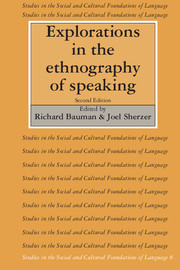Book contents
- Frontmatter
- Contents
- INTRODUCTION TO THE SECOND EDITION
- I PREFACE AND INTRODUCTION
- II COMMUNITIES AND RESOURCES FOR PERFORMANCE
- III COMMUNITY GROUND RULES FOR PERFORMANCE
- IV SPEECH ACTS, EVENTS, AND SITUATIONS
- V THE SHAPING OF ARTISTIC STRUCTURES IN PERFORMANCE
- Introduction
- 14 Correlates of Cree Narrative Performance
- 15 An Analysis of the Course of a Joke's Telling in Conversation
- 16 When Words Become Deeds: An Analysis of Three Iroquois Longhouse Speech Events
- 17 The Ethnographic Context of Some Traditional Mayan Speech Genres
- 18 To Speak with a Heated Heart: Chamula Canons of Style and Good Performance
- VI TOWARD AN ETHNOLOGY OF SPEAKING
- Notes
- References
- Index of names
Introduction
Published online by Cambridge University Press: 05 June 2012
- Frontmatter
- Contents
- INTRODUCTION TO THE SECOND EDITION
- I PREFACE AND INTRODUCTION
- II COMMUNITIES AND RESOURCES FOR PERFORMANCE
- III COMMUNITY GROUND RULES FOR PERFORMANCE
- IV SPEECH ACTS, EVENTS, AND SITUATIONS
- V THE SHAPING OF ARTISTIC STRUCTURES IN PERFORMANCE
- Introduction
- 14 Correlates of Cree Narrative Performance
- 15 An Analysis of the Course of a Joke's Telling in Conversation
- 16 When Words Become Deeds: An Analysis of Three Iroquois Longhouse Speech Events
- 17 The Ethnographic Context of Some Traditional Mayan Speech Genres
- 18 To Speak with a Heated Heart: Chamula Canons of Style and Good Performance
- VI TOWARD AN ETHNOLOGY OF SPEAKING
- Notes
- References
- Index of names
Summary
That verbal art and artistic verbal performance should figure prominently among the concerns of the ethnography of speaking is not surprising, since to participant and analyst alike the verbal art forms of a culture and the situations in which they are employed represent the most conspicuous, attractive, or powerful sectors of the speech activity of any society. Yet a truly ethnographic approach to verbal art, in the sense of a focus upon the situated use of verbal art forms conceived of as communicative process, is, like the ethnography of speaking itself, a relatively recent development. Anthropologists, linguists, and folklorists alike have tended over whelmingly to view verbal art, like language, as abstracted from social use. In all three disciplines, the unit of analysis in the study of verbal art has been the textual item, the myth, legend, song, or ritual speech, treated as a self-contained entity. To be sure, anthropologists at least have recognized and acknowledged the association of these items with events, but the principal frame of reference against which they have been studied – when such factors have been studied at all – is the culture or society as a whole. That is, the item is conceptualized as collective representation, shaped primarily by the shared culture, history, language, or character (in the collective psychological sense) of the members of the society in which it is current, and secondarily perhaps – more among folklorists than anthropologists – by the cumulative effects of long-term transmission through time and space.
- Type
- Chapter
- Information
- Explorations in the Ethnography of Speaking , pp. 311 - 314Publisher: Cambridge University PressPrint publication year: 1989

